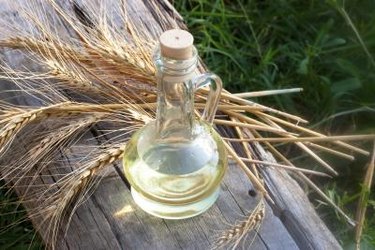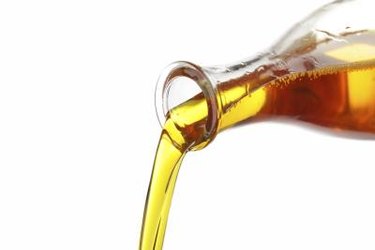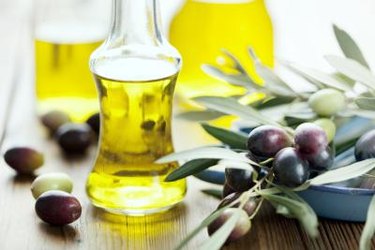
Sunflower oil is a liquid fat derived from sunflower seeds. Liquid fats are necessary ingredients found in most recipes. Although you can usually substitute a liquid fat for another liquid fat when incorporating recipe ingredients, you cannot replace a liquid fat with a solid one -- such as butter or lard. Solid fats react differently than liquid fats when heated and therefore affect the recipe's outcome.
Safflower Oil
Video of the Day

Like sunflower oil, safflower oil is also light oil. It comes from a plant. It has a watery yellow-green color and a mild taste. According to Baking 911, sunflower oil resembles characteristics also present in safflower oil, which makes safflower oil an appropriate substitute. Safflower oil has the greatest concentration of polyunsaturated fat of commercially-sold oils. It's compatible for cooking and baking at medium and medium-high temperatures.
Video of the Day
Corn Oil

Corn oil is similar to sunflower oil with its mild taste, which make it less detectable in dishes. Corn oil tends to complement cooking recipes rather than overpower the taste of a recipe's main ingredients. It often enhances the flavor of baked goods, providing a buttery taste. Use it for recipes that require medium and medium-high heat, but not high heat which is more than 400 degrees Fahrenheit -- because corn oil has a tendency to smoke at higher temperatures.
Olive Oil

Olive oil is versatile oil that serves as a substitute for other oils. Replace sunflower oil with extra-light olive oil, which has the mildest flavor of all olive oils. Most olive oils have a robust flavor. Olive oil can be used for most baking recipes and sautéing. One drawback to using olive oil is that it smokes at 375 and 400 degrees Fahrenheit whereas sunflower oil has a higher smoke point of greater than 400 degrees Fahrenheit.
Vegetable Oil

Vegetable oils are multipurpose oils. Use them for frying, sautéing and baking. They have a high smoke point of more than 400 degrees Fahrenheit. Vegetable oils taste bland, not unlike sunflower oil and generally do not impart flavor in dishes and baked goods. They are normally blends of oils extracted from grains, plants, fruit and seeds. Baking 911 recommends buying vegetable oils that list pure oils among top ingredients -- because these are better oils for cooking.